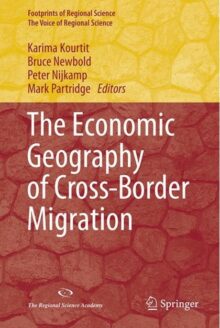
The Economic Geography of Cross-Border Migration
Edited by:
Karima Kourtit, Jheronimus Academy of Data Science’S-Hertogenbosch, The Netherlands
Bruce Newbold, McMaster University Hamilton, Canada
Peter Nijkamp, Jheronimus Academy of Data Science’S-Hertogenbosch, The Netherlands
Mark Partridge,The Ohio State University Columbus, USA
Springer; 1st ed. 2021 edition (8 December, 2020)
About this book
This handbookpresents a collection of high-quality, authoritative scientific contributions on cross-border migration, written by a carefully selected group of recognized migration experts from around the globe. In recent years, cross-border migration has become an important and intriguing issue, from both a scientific and policy perspective. In the ‘age of migration’, the volume of cross-border movements of people continues to rise, while the nature of migration flows – in terms of the determinants, length of stay, effects on the sending and host countries, and legal status of migrants – is changing dramatically.
Based on a detailed economic-geographical analysis, this handbook studies the motives for cross-border migration, the socio-economic implications for sending countries and regions, the locational choice determinants for cross-border migrants, and the manifold economic-geographic consequences for host countries and regions. Given the complexity of migration decisions and their local or regional impacts, a systematic typology of migrants (motives, legal status, level of education, gender, age, singles or families, etc.) is provided, together with an assessment of push factors in the place of origin and pull factors at the destination. On the basis of a solid analytical framework and reliable empirical evidence, it examines the impacts of emigration for sending areas and of immigration for receiving areas, and provides a comprehensive discussion of the policy dimensions of cross-border migration.
Publication date: 8 December 2020 ISBN: 978-3-030-48290-9
Editors

Karima Kourtit is leader of the Department of Smart Cities at the Jheronimus Academy of Data Science (JADS), ’s-Hertogenbosch, the Netherlands: an inter-university research and education centre jointly operated by Eindhoven University of Technology and Tilburg University, the Netherlands. She has worked at the Center for the Future of Places (CFP) at the Department of Urban Planning and Environment, the School of Architecture and Built Environment, at the KTH, Royal Institute of Technology, Stockholm, and at Adam Mickiewicz University (AMU), Poznan, Poland
K. Bruce Newbold is a professor of geography at McMaster University, where he received his PhD in 1994. He taught at the University of Illinois (1994–2000) before returning to McMaster in 2000. He has held guest scholar positions at the University of California San Diego’s Center for Comparative Immigration Studies (CCIS) and at the University of Glasgow’s Social and Public Health Sciences Unit, where he held a Journal of Urban Studies Fellowship. He is currently the Director of the School of Geography & Earth Sciences at McMaster.
Peter Nijkamp is an emeritus professor of regional and urban economics and economic geography at the VU University, and is affiliated with the Jheronimus Academy of Data Science (JADS), ‘s-Hertogenbosch (the Netherlands), the Royal Institute of Technology (KTH), Stockholm (Sweden) and A. Mickiewicz University, Poznan (Poland). He serves on the editorial/advisory boards of more than 30 journals. According to the RePec list he is one of the top 30 most well known economists in the world.
Mark Partridge is the C. William Swank Chair of Rural-Urban Policy at The Ohio State University, USA, and a professor at the AED Economics Department. He is also an economic consultant at the Federal Reserve Bank of Chicago and an adjunct professor at Jinan University, Guangzhou, China. He has previously served as the Canada Research Chair in the New Rural Economy at the University of Saskatchewan. Professor Partridge has published over 125 peer-reviewed journal papers. His work has been ranked number one in regional science and among the top 1000 economists in the world.
More information from the publisher
Learn more on ERSA members published books here.

Stay updated on ERSA upcoming activities, subscribe to ERSA E-newsletter
